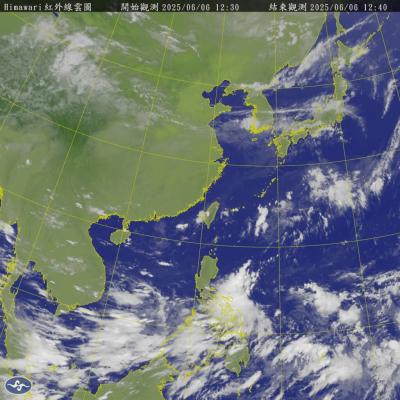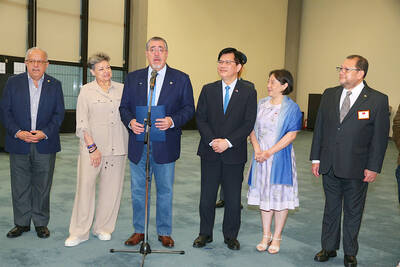A comparison of State Department guidelines issued this month to all US diplomatic personnel explaining US policy on interactions with Taiwan and a parallel document issued in September 2006 shows that the latest guidelines contain a broad range of new prohibitions, despite statements by US and Taiwanese officials that the new guidelines offer “nothing new.”
The new guidelines, sent to all US diplomatic posts in an annual cable in advance of the Double Ten Day celebrations, are nearly twice as long as the 2006 document. The Taipei Times obtained a copy of the 2006 version on Wednesday.
Officials at the Ministry of Foreign Affairs and the American Institute in Taiwan (AIT) became the first officials from either side to confirm the existence of the guidelines after a story about them appeared in the Taipei Times on Tuesday.
The Taipei Times has yet to receive a copy of last year’s guidelines, so it was not clear whether the additional prohibitions were added this month or a year ago, when tensions between US President George W. Bush, seeking China’s international support, and former president Chen Shui-bian (陳水扁) were at rock bottom.
But the 2006 document contained significantly fewer prohibitions than the current one.
For instance, this year’s cable added a ban on flying the Taiwanese flag at any US government building, inserted a long section that severely limits US correspondence with Taiwanese officials, makes reference to the US’ so-called “one China” policy, contains a long section on the US’ policy toward Taiwan’s membership in international organizations and has a detailed list of curbs and prohibitions on travel by US officials to Taiwan.
None of these appeared in the 2006 cable.
In no part of the recent document are the tight restrictions on meetings between US and Taiwanese officials relaxed.
The cables are based on US government restrictions on interactions with Taiwan in force in one form or another since the US broke diplomatic relations in 1978, and most recently issued as formal guidelines in 2001, just after Bush took office. However, references in the 2006 cable indicate that the annual cables have been issued at least since 1991, when Bush’s father, George Bush, was president.
One of the more striking additions to the current cable is the section on Taiwan’s international participation, which does not directly relate to the cable’s main subject.
“Consistent with our one China policy,” it says, the US does not support Taiwanese membership in organizations requiring statehood, although it does support “as appropriate” Taiwan’s “involvement” in other international bodies.
“Within the parameters of our one China policy,” it adds, the US “does not take a position on what Taiwan’s title should be in international organizations. The United States supports flexible arrangements and nomenclature acceptable to both the PRC [People’s Republic of China] and Taiwan and opposes attempts by either side to use nomenclature for political purposes inconsistent with US policy.”
Washington’s “overall goal,” it says, is “to enable the people on [sic] Taiwan to comply with international regulations and guidelines and receive appropriate international assistance and advice, despite Taipei’s general lack of recognition as an independent state.”
If that paragraph was added last year, as appears likely, instead of this month, that would coincide with Chen’s efforts to win an election-day referendum to have Taiwan join the UN using the name Taiwan, a move, vehemently opposed by both China and the Bush administration, that poisoned Washington-Taipei relations last year.
The other additions to the cable, such as the travel restrictions, the convoluted rules on written correspondence and the strictures on attending official affairs and parties, are not inconsistent with the 2001 guidelines.
In Taiwan, the Ministry of Foreign Affairs yesterday reiterated that the latest guidelines do not offer any new insight into Washington’s Taiwan policy.
The document, ministry spokesman Henry Chen (陳銘政) said, has been sent each year since 1991 and although there have been minor changes, the overall principles remain the same.
AIT Director Stephen Young echoed Henry Chen’s remarks and said that US policy toward Taiwan had “not changed at all.”
“The media just made a story out of it,” he said yesterday.
AIT Press Officer Lawrence Walker said the AIT was a non-governmental organization that is instructed to carry out unofficial relations between Taiwan and the US and therefore a bulk of the guidelines do not pertain to AIT staff, such as attending the Double Ten Day celebrations.
ADDITIONAL REPORTING BY JENNY W. HSU

Greenpeace yesterday said that it is to appeal a decision last month by the Taipei High Administrative Court to dismiss its 2021 lawsuit against the Ministry of Economic Affairs over “loose” regulations governing major corporate electricity consumers. The climate-related lawsuit — the first of its kind in Taiwan — sought to require the government to enforce higher green energy thresholds on major corporations to reduce emissions in light of climate change and an uptick in extreme weather. The suit, filed by Greenpeace East Asia, the Environmental Jurists Association and four individual plaintiffs, was dismissed on May 8 following four years of litigation. The

STAY AWAY: An official said people should avoid disturbing snakes, as most do not actively attack humans, but would react defensively if threatened Taitung County authorities yesterday urged the public to stay vigilant and avoid disturbing snakes in the wild, following five reported snakebite cases in the county so far this year. Taitung County Fire Department secretary Lin Chien-cheng (林建誠) said two of the cases were in Donghe Township (東河) and involved the Taiwan habus, one person was bit by a Chinese pit viper near the South Link Railway and the remaining two were caused by unidentified snakes. He advised residents near fields to be cautious of snakes hiding in shady indoor areas, especially when entering or leaving their homes at night. In case of a

A tropical disturbance off the southeastern coast of the Philippines might become the first typhoon of the western Pacific typhoon season, the Central Weather Administration (CWA) said. The system lacks a visible center and how it would develop is only likely to become clear on Sunday or Monday, the CWA said, adding that it was not yet possible to forecast the potential typhoon's effect on Taiwan. The American Meteorological Society defines a tropical disturbance as a system made up of showers and thunderstorms that lasts for at least 24 hours and does not have closed wind circulation.

DIPLOMACY: It is Guatemalan President Bernardo Arevalo’s first visit to Taiwan since he took office last year, while Eswatini’s foreign minister is also paying a visit A delegation led by Guatemalan President Bernardo Arevalo arrived in Taiwan yesterday afternoon and is to visit President William Lai (賴清德) today. The delegation arrived at Taiwan Taoyuan International Airport at 4:55pm, and was greeted by Minister of Foreign Affairs Lin Chia-lung (林佳龍). It is Arevalo’s first trip to Taiwan since he took office last year, and following the visit, he is to travel to Japan to celebrate the 90th anniversary of diplomatic relations between the two countries. Arevalo said at the airport that he is very glad to make the visit to Taiwan, adding that he brings an important message of responsibility